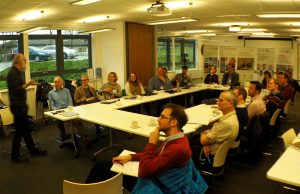7 February 2019: NFM programme modelling workshop, Lancaster University

We held a successful internal-programme workshop on a modelling on 7 February at the University of Lancaster. The areas we probed included:
- Proposed modelling approaches across the 3 projects
- Terminology
- How to derive and present uncertainty
- How models will be informed by in field measurements
- Evaluating model performance
- Data quality
- Changing performance over time of NFM measures e.g. leaky dams or tree planting
- Communicating about modelling with stakeholders
This is the first of such science workshops to be held. Each will focus on a topic of interest as the programme progresses. The aim of the workshops is to develop consistency of research approaches, share ongoing findings plus technical expertise and highlight programme research gaps. Future topics are likely to include measurements and monitoring, quantifying NFM performance over time, and translation of science into practice.
23 October 2018: NERC NFM Programme Mini-Workshop on Research Communications, Reading University
We’ve just had a productive workshop on knowledge exchange for the NFM research programme at the University of Reading. We discussed topics including:
- Setting clear objectives for communication
- Understanding who we need to engage with and how
- Communicating complex research in clear succinct ways
- Lessons learned from earlier work – what worked and what didn’t
Members of the 3 project research teams were joined by stakeholders from the Environment Agency, Natural Resource Wales, Moors for the Future, The Rivers Trust, the Foundation for Water Research, Pang Valley Flood Forum, Loddon Valley Residents Association and JBA Consulting. Thanks to all who contributed.
The recommendations and outputs from the workshop will be used to shape communications planning for the programme.
Successful knowledge exchange will be critical to our research programme and will take many forms from sharing data to seeking input from farmers and communities to promoting findings at conferences to informing policymakers.

